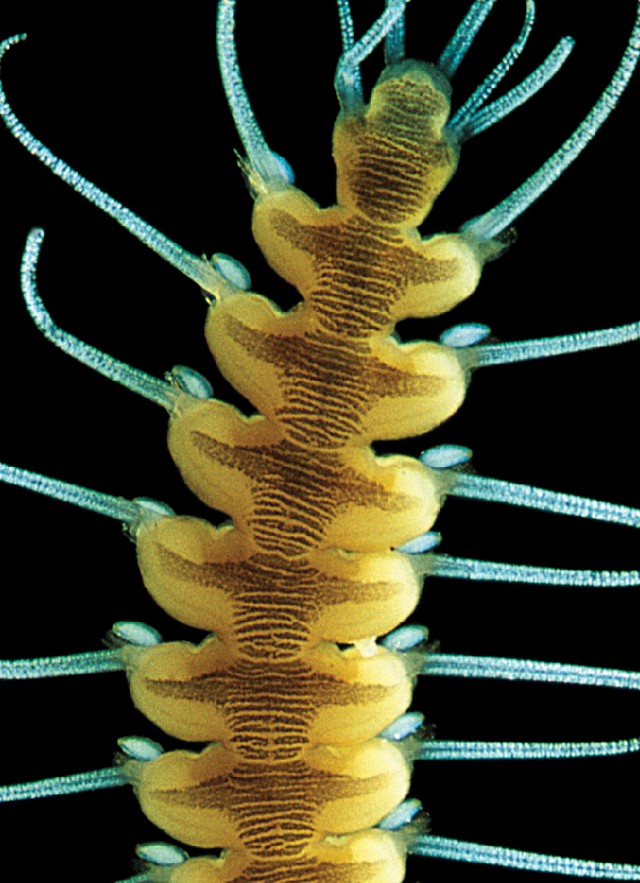Polychaetous Annelids

The class Polychaeta ("poly-keet-a") consists of a very diverse group of segmented worms (unlike round worms or flatworms, which are not segmented) that live primarily in ocean habitats. The closest relatives of polychaetes are the earthworms and leeches, which comprise the class Clitellata, all of which are members of the phylum Annelida. Among the over 80 plus polychaete families and more than 10,000 described species there is an amazing array of body forms and sizes. Although polychaetes are largely unknown to most people that visit the seashore, our understanding of the impacts of human activities on the oceans can be monitored accurately only through the careful study of these denizens of the deep.
The Polychaete Department, staffed by a Curator and Collections Manager, maintains active research programs ranging from basic polychaete systematics, to the study of evolutionary relationships within particular polychaete families, to investigations into philosophy of biology that impinge on how evolutionary biology operates within the scope of the nature of science.
New collections are routinely acquired, such that the collection is a near-constantly expanding resource utilized by researchers from around the world. In addition to the loan of specimens, the department provides space to accommodate short-term visitors, who provide valuable opportunities for collaboration.
RESEARCH
The Natural History Museums of Los Angeles County's (NHMLAC) polychaete collection represents one of the world's most important repositories for this group of organisms. With over 200,000 containers holding several million specimens, the collection maintains the most comprehensive coverage of eastern Pacific polychaete species in the world. Because of its world-class status, the collection receives near-constant use by marine biologists from the west coast, and specimens are routinely lent to specialists all over the world.
Some of our greatest strengths are:
- Unparalleled in breadth of coverage of eastern Pacific habitats, both in terms of depth (intertidal to abyssal) and volume of readily available material; the Museum's holdings of polychaete worms represent the major source of material for all monographic work on the group in the eastern Pacific.
- World-wide representation especially from Indian, Pacific, and Antarctic oceans.
- Numerous environmental survey collections over the past 40 years in a range of depths along the coasts of Oregon, California, and Mexico.
- The collection is an ongoing fundamental resource for most of the environmental agencies along the west coast of North America.
- The collections are historically vital to important conservation biology, biodiversity, and environmental assessment issues, especially in the eastern Pacific.
Our understanding of how the oceans operate and affect our very existence is dependent upon understanding the diversity of life in all ocean habitats. For instance, marine biologists monitoring the health of a particular region must rely on knowing what species occur in a given area and the role they play in the ecosystem. If we scoop up mud or sand from the sea floor on any part of the planet, regardless of depth, we find that polychaetes are usually the dominant organisms. As a consequence, marine biologists have found polychaetes to be excellent indicators of the effects of pollutants, as well as pointing to natural and human-induced changes in ecosystems.
In order to accurately monitor the health of the world's oceans, marine biologists must be able to correctly identify the organisms they encounter. This is one of the reasons that NHMLAC maintains one of the world's largest polychaete collections, and why the collection receives so much use by researchers around the world.
RESOURCES
Common Terrestrial & Freshwater Worms in the Los Angeles Region
Polychaetes: The Extraordinary World of Marine Segmented Worms
Our Staff
CONTACT
Leslie H. Harris
Collections Manager
lharris@nhm.org
213.763.3234
J. Kirk Fitzhugh
Curator
kfitzhug@nhm.org
213.763.3233